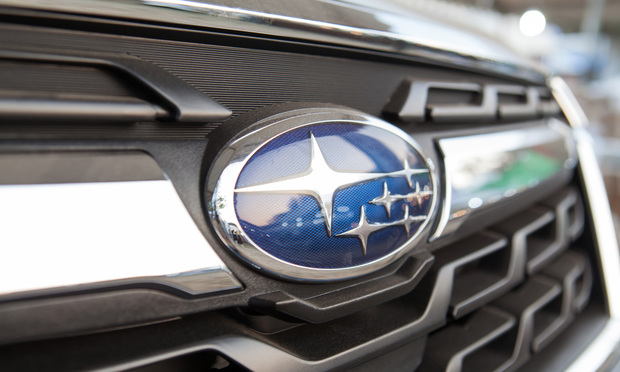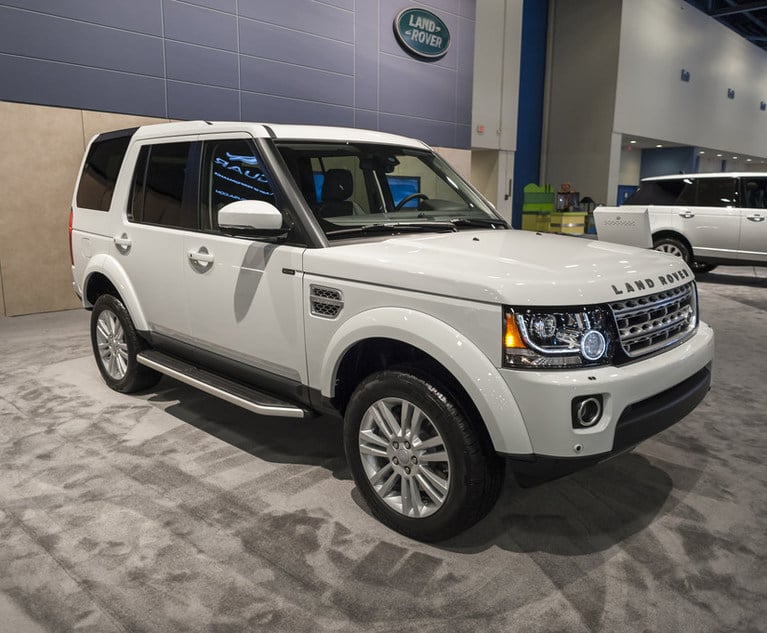Settlement Over Subaru Infotainment System, Including $1.5M in Fees, Gets Final Approval
Counsel for the plaintiffs in "Udeen v. Subaru of America" are to be paid $1.5 million in fees and costs.
July 01, 2020 at 04:58 PM
6 minute read
 Subaru
Subaru
A federal judge has granted final approval to a settlement in a putative nationwide class action against Subaru over its Starlink infotainment system. The settlement could affect some 785,000 owners and lessees, and is valued at roughly $6.25 million.
In addition, counsel for the plaintiffs in Udeen v. Subaru of America are to be paid $1.5 million in fees and costs.
Senior U.S. District Judge Robert Kugler of the District of New Jersey signed the order approving the final settlement on Tuesday.
"Pursuant to Federal Rule of Civil Procedure 23(e), the Court hereby grants final approval of the settlement and finds that it is, in all respects, fair, reasonable, and adequate and in the best interests of the Settlement Class," the order states.
The case involves the 2018 Subaru Outback, 2018 Subaru Forester, 2018 Subaru Legacy, 2018 Subaru Crosstrek, 2017-2018 Subaru Imprezas, and 2018 Subaru BRZ.
Under terms of the settlement, owners and lessees of those vehicles are to be compensated based on multiple visits to a Subaru dealer for a Starlink repair or complaint ($150 for two repair visits, $300 for three or more visits—or, at the class member's election, vouchers that can be used for Subaru service, apparel, or a new vehicle).
It also provides for compensation at the rate of $16 per day during the period of time when Starlink replacement head units were on back order.
About 9,590 class members are eligible to receive that amount, according to the documents, which estimate the value of that component of the settlement at $2.08 million.
Also, class members who incurred expenses not covered by a voluntary Starlink recall could be refunded up to $90 for costs of alternative transportation. It is unknown how many are in that category.
"Our team is very pleased with the results we achieved for our clients and the class," said Benjamin Johns of Chimicles Schwartz Kriner & Donaldson-Smith in Haverford, Pennsylvania, counsel to the plaintiffs, in a phone call.
"The final approval hearing last week was also apparently the first in-person proceeding in the New Jersey federal court system since the closures from the pandemic," he added. "It was neat to play a little role in this historic event."
Johns worked with colleagues Andrew Ferich and Alex Kashurba of the same firm, Kevin Roddy of Wilentz, Goldman & Spitzer in Woodbridge, and Daniel Lapinski of Motley Rice in Cherry Hill in representing the plaintiffs.
Subaru was represented by Neal Walters and Casey Watkins of Ballard Spahr's Cherry Hill office.
"Subaru of America Inc. has agreed to settle a lawsuit alleging that certain 2017-2018 Subaru Impreza, 2018 Subaru Forester, 2018 Subaru Outback, 2018 Subaru Legacy, 2018 Subaru Crosstrek, and 2018 Subaru BRZ vehicles may experience issues with the Starlink infotainment systems," Walters and Watkins said in an email. "Although Subaru denies the claims in the lawsuit, it has, in the interest of customer satisfaction, agreed to extend the warranty for up to five years or 100,000 miles to address any customer concerns regarding this alleged condition.
"Additionally, the company will reimburse customers for certain out of pocket expenses. We believe that by entering into this settlement, Subaru has affirmed its reputation for standing behind its products and taking care of its customers," said the joint statement.
In addition to the attorney fees and litigation costs, Subaru agreed to pay incentive awards of $3,500 to each of the seven class representatives named as plaintiffs: Chad Udeen, Mary Jane Jeffery, Lydia Runkel, Michael Bolick, Gary Gilpin, Alicia Smith and Susan Williams.
In Tuesday's order, Kugler approved the exclusion of 155 class members who opted out of the settlement.
Subaru is a Japanese corporation. Subaru of America was founded in 1968 in Bala Cynwyd, Pennsylvania, and the following year moved to Pennsauken. The company's headquarters were located in Cherry Hill from 1986 until 2018, when they moved to the Camden waterfront.
The suit was initiated in 2018 by consumers, led by Udeen of Tennessee, who purchased or leased one of the class vehicles equipped with the Subaru Starlink system, which consists of a touch screen multimedia interface in the front-center console.
Starlink is designed to provide the display for the backup camera, as well as an interface for making phone calls, using the GPS navigation system, and accessing radio controls.
The suit claimed numerous malfunctions, including that the backup camera freezes or shuts down; audio and radio functions fail; the display shuts off even though functions of the infotainment system remain working; and the radio will not shut off or turn down when backing up. Malfunctions with navigation and Bluetooth calls also were alleged.
The suit originally was filed in Camden County Superior Court in November 2018, and was removed to U.S. District Court for the District of New Jersey the following month.
Subaru previously moved to dismiss and sought to stay all discovery, but U.S. Magistrate Judge Joel Schneider in March 2019 denied Subaru's motion to stay full discovery.
"Defendants' concern about 'extremely expensive' discovery is overblown," Schneider said at the time. "Further, contrary to defendants' argument, a discovery stay will not simplify the issues for trial. In fact, the opposite is true."
Schneider, referencing Chalames v. OKI Data Americas, a U.S. District Court of New Jersey decision from 2007, said, "the mere filing of a motion to dismiss does not stay discovery."
Reaching the settlement included two mediation sessions in May 2019 with Dennis Cavanaugh, a retired federal judge with McElroy, Deutsch, Mulvaney & Carpenter, according to the court documents.
The parties continued to finalize terms of the settlement last fall.
Subaru denied the allegations, and didn't admit fault in the settlement agreement, which initially was reached on Aug. 30, 2019.
Preliminary approval was granted on Oct. 4, 2019, triggering the issuance of notice to the class, and giving class members the opportunity to respond to the settlement and submit claims.
A final approval hearing was scheduled in March 2020 but was delayed until last month.
This content has been archived. It is available through our partners, LexisNexis® and Bloomberg Law.
To view this content, please continue to their sites.
Not a Lexis Subscriber?
Subscribe Now
Not a Bloomberg Law Subscriber?
Subscribe Now
NOT FOR REPRINT
© 2025 ALM Global, LLC, All Rights Reserved. Request academic re-use from www.copyright.com. All other uses, submit a request to [email protected]. For more information visit Asset & Logo Licensing.
You Might Like
View All
Volkswagen Hit With Consumer Class Action Alleging Defective SUV Engines
3 minute read
Lack of Available Auto Safety Features Does Not Equal Products Liability Act Violation, NJ Appeals Court Says
4 minute read
Class-Action Suit Filed Against Jaguar for Claims of Defective Windshields in Land Rover Defender

Law Firm Accused of Raiding Trust Account to Pay for Fraudster's Birthday Party, Expenses
4 minute readLaw Firms Mentioned
Trending Stories
- 15th Circuit Considers Challenge to Louisiana's Ten Commandments Law
- 2Crocs Accused of Padding Revenue With Channel-Stuffing HEYDUDE Shoes
- 3E-discovery Practitioners Are Racing to Adapt to Social Media’s Evolving Landscape
- 4The Law Firm Disrupted: For Office Policies, Big Law Has Its Ear to the Market, Not to Trump
- 5FTC Finalizes Child Online Privacy Rule Updates, But Ferguson Eyes Further Changes
Who Got The Work
J. Brugh Lower of Gibbons has entered an appearance for industrial equipment supplier Devco Corporation in a pending trademark infringement lawsuit. The suit, accusing the defendant of selling knock-off Graco products, was filed Dec. 18 in New Jersey District Court by Rivkin Radler on behalf of Graco Inc. and Graco Minnesota. The case, assigned to U.S. District Judge Zahid N. Quraishi, is 3:24-cv-11294, Graco Inc. et al v. Devco Corporation.
Who Got The Work
Rebecca Maller-Stein and Kent A. Yalowitz of Arnold & Porter Kaye Scholer have entered their appearances for Hanaco Venture Capital and its executives, Lior Prosor and David Frankel, in a pending securities lawsuit. The action, filed on Dec. 24 in New York Southern District Court by Zell, Aron & Co. on behalf of Goldeneye Advisors, accuses the defendants of negligently and fraudulently managing the plaintiff's $1 million investment. The case, assigned to U.S. District Judge Vernon S. Broderick, is 1:24-cv-09918, Goldeneye Advisors, LLC v. Hanaco Venture Capital, Ltd. et al.
Who Got The Work
Attorneys from A&O Shearman has stepped in as defense counsel for Toronto-Dominion Bank and other defendants in a pending securities class action. The suit, filed Dec. 11 in New York Southern District Court by Bleichmar Fonti & Auld, accuses the defendants of concealing the bank's 'pervasive' deficiencies in regards to its compliance with the Bank Secrecy Act and the quality of its anti-money laundering controls. The case, assigned to U.S. District Judge Arun Subramanian, is 1:24-cv-09445, Gonzalez v. The Toronto-Dominion Bank et al.
Who Got The Work
Crown Castle International, a Pennsylvania company providing shared communications infrastructure, has turned to Luke D. Wolf of Gordon Rees Scully Mansukhani to fend off a pending breach-of-contract lawsuit. The court action, filed Nov. 25 in Michigan Eastern District Court by Hooper Hathaway PC on behalf of The Town Residences LLC, accuses Crown Castle of failing to transfer approximately $30,000 in utility payments from T-Mobile in breach of a roof-top lease and assignment agreement. The case, assigned to U.S. District Judge Susan K. Declercq, is 2:24-cv-13131, The Town Residences LLC v. T-Mobile US, Inc. et al.
Who Got The Work
Wilfred P. Coronato and Daniel M. Schwartz of McCarter & English have stepped in as defense counsel to Electrolux Home Products Inc. in a pending product liability lawsuit. The court action, filed Nov. 26 in New York Eastern District Court by Poulos Lopiccolo PC and Nagel Rice LLP on behalf of David Stern, alleges that the defendant's refrigerators’ drawers and shelving repeatedly break and fall apart within months after purchase. The case, assigned to U.S. District Judge Joan M. Azrack, is 2:24-cv-08204, Stern v. Electrolux Home Products, Inc.
Featured Firms
Law Offices of Gary Martin Hays & Associates, P.C.
(470) 294-1674
Law Offices of Mark E. Salomone
(857) 444-6468
Smith & Hassler
(713) 739-1250






